Given the time invested and the experience I now possess, if I were to embark on the same journey in 2016 with my current state of mind, not only would I have done quite well for myself but it would have been some hell of a reassurance.
Don’t get me wrong. It’s not like I regret anything. It’s just that when you set out by yourself, with nothing but only 200$ to your name, things can be pretty daunting. Here I am right now crossing borders every month, doing pretty great.
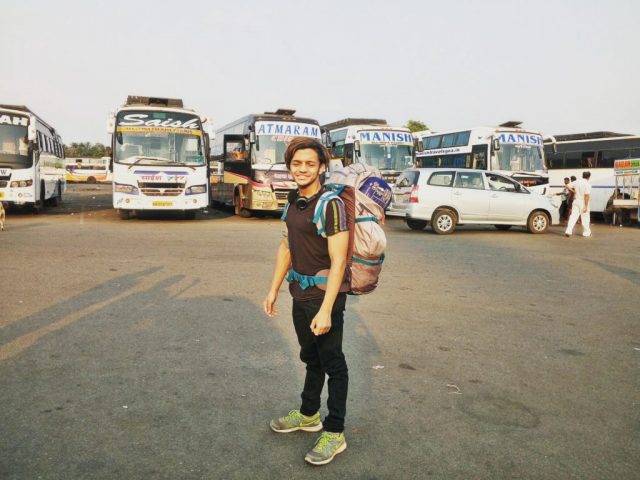
You don’t need ‘X’ amount of money saved up to embark on a journey. You can do it cheaply too. Or in some cases, even free. One of the main reasons I’m penning down this article is because I want this article to be a means of assurance and guidance. Especially to those who are just starting out. Look at this article as a guide so that you can build yourself a roadmap when you set out to travel.
All the suggestions/guides/tips have been included so that you can explore any location without worrying about any financial constraints.
This won’t be your regular article with vague copy pasta advice. I’ve been on the road for the past seven years. All these experiences that I’ve gone through all these years have defined me in ways that one possibly can’t imagine. All the tips I suggest have worked out for me and will help you too. At least to a certain degree.
But first things first. If you want good things to happen, you have to risk it. You have to take that plunge. The more you think about it, the more you research or try to ‘perfect’ it, you’ll just keep stalling. Sometimes it’s better to take the plunge and figure it out while you go about it.
I’m not gonna lie. Traveling for free is a bit too difficult. It’s the bitter truth. However, there are ways to get by. In some regard, even if you are not able to travel for free, there are ways where you can do it cheaper. But let’s get something out of the way. You don’t have to be rich to travel frequently. It’s an age-old idea that stems from the fact that only the people with higher privileges (eg passports) could travel. It’s an outdated concept of thinking. Quite a few manage to travel by spending far less than you can possibly imagine.
Back in April 2016, when I set out with less than $200, my goal was to make money while I travel. I was headstrong and a little bit nervous. It was my first time going on a solo trip. But I never let any of that scare me. During the first 6 months of my travels, I made a list of every hotel and cafe that I came across. I then proceeded to speak with the owner/manager and offered to build them a website for their business in exchange for a couple of nights of stay.
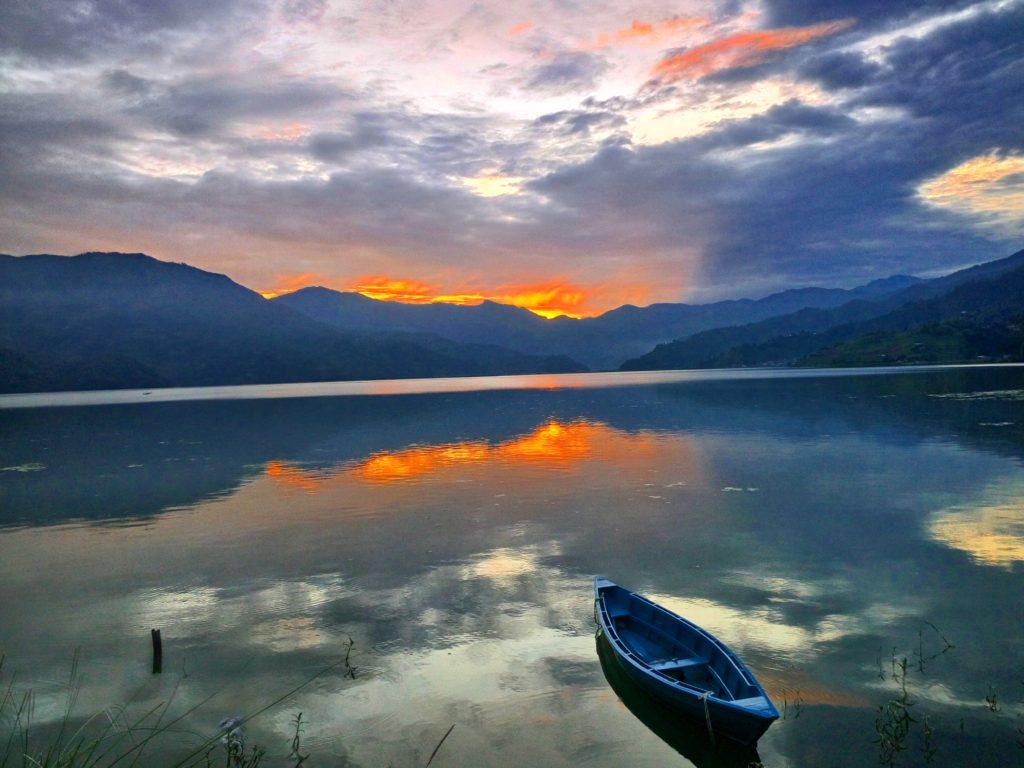
Not everyone agreed but I did manage to snag a few clients. Throughout this whole ordeal, I had perseverance and hard work engrained in me. It was now all about going on without backing down. When you have to survive, your mind tends to go on autopilot. I wasn’t really sure what was happening but all I knew was that I had to make that dough and survive.
I slowly moved on to building blogs and ended up being the head of Foundr by 20. I had completely mastered SEO and my blogs were bringing in passive income.
No this is not a ‘get rich’ article or how to make money doing ‘xyz’. I’ve already penned down an article for that here. The reason I’m talking about all of this is because when you’re out traveling full time, it won’t hurt to implement some of the things I did to a certain degree. If you can travel dirt cheap AND make money while at it, you have a bright future. It’s the sweet spot.
It’s what many would die for.
Not literally.
Now let’s head on to my guide on how to travel for free. Or cheap.
How To Travel For Free or Very Very Cheap
1. Plan Your Flights Well!
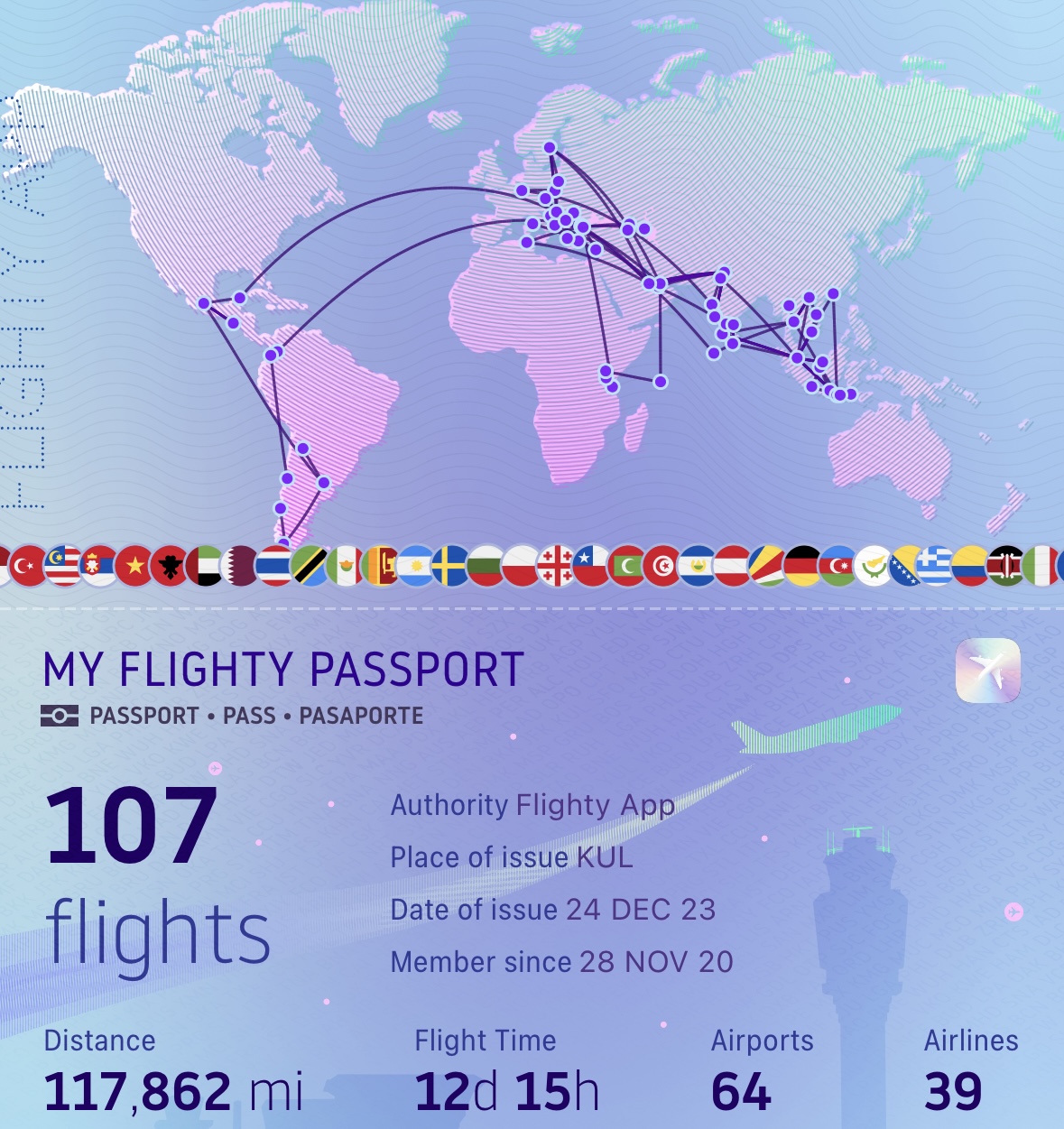
First things first, get your flights sorted well! By that, I mean book flights that don’t cost you a jaw-dropping amount which may potentially set you back on your spending at the destination.
You have to plan your flights well. When you decide on a date, make sure it’s not a public holiday. Or a weekend. Or peak tourism season of the destination. Lots of people tend to go on vacation during these times which leads to airfare shooting up.
I highly recommend subscribing to the ‘price alert’ feature on the different flight booking sites. Most of the top websites have that feature. What this feature does is notify you about the changes in the price of a particular flight.
You can try looking up flights on Skyscanner. It’s a metasearch engine that allows you to compare prices from different airlines and online travel agencies (OTAs) in one place. You can even try using Google Flight which is basically a metasearch engine too, just like Skyscanner.
Then there’s Kayak.com. While it may be a regular old metasearch engine just like Skyscanner and Google Flights, it does have a few tricks up its sleeves. Kayak.com also has a “Price Forecast” feature that predicts whether the price for a particular flight is likely to go up or down. And a “Hacker Fares” feature that combines two one-way tickets from different airlines to create a cheaper round-trip fare.
To read more about these websites and nifty little features, you can check out my Best Flight Booking Website Guide.
Also, make sure to take advantage of the fact that all major U.S. airlines allow a grace period of 24 hours for travelers to make cancellations as mandated by law set by the Department of Transportation. In case you find a better deal or run into a slight hiccup, you can always cancel your flight later that day.
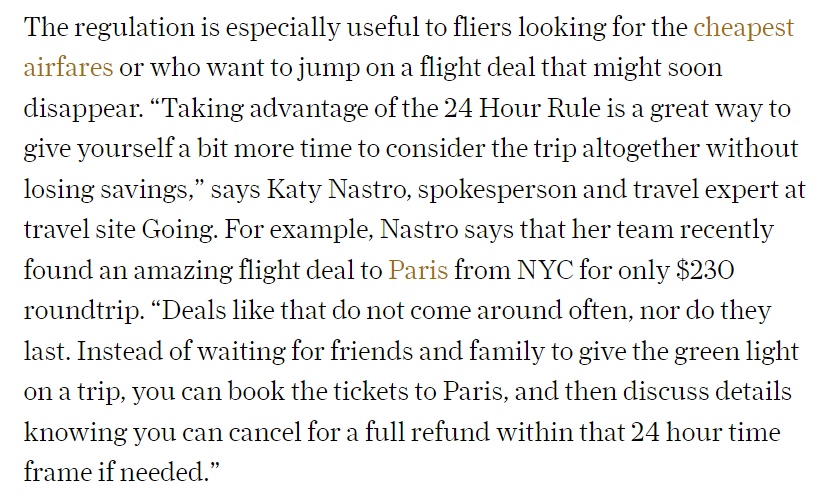
Excerpt from Conde Nast Traveler
Usually, flights tend to be a lot cheaper if you book them months in advance. If you play your cards right and book a flight 3 months from now, you’ll not only get a great deal on airfare but will also be able to plan your budget well.
2. Make the best use of Foreign Exchange

Always determine your destination’s economic condition. More particularly in terms of foreign exchange rates. Has the currency been declining? Has it been increasing? Not calculating foreign exchange rates can result in heavy spending. Since the American Dollar is one of the strongest currencies, use it to your advantage. If you have been planning your trip for months, it’s wise to monitor the rates and exchange the currency while it is at its lowest.
Also based on the country you’re going to it’ll be worth it to skip the ATM and just exchange cash (or actually the opposite if you have a good credit card)
However, the downside to this is carrying so much cash can be risky. If you are clumsy even for a bit, there’s a high chance that you might get pickpocketed. Popular destinations in Europe like Zurich, Paris, and a lot more are notorious.
Alternatively, you can go for an international Credit Card. American Express® Gold Card levies no fees for foreign transactions. They charge an annual fee of $250 and give out a lot of benefits like $120 dining credit (annually), $120 Uber Cash annually ($10 a month) for U.S. Uber Eats orders and U.S. Uber rides, and a strong rewards program with 4X points earned at restaurants and 3X points earned on flights booked directly with airlines or amextravel.com. You’ll need a very good credit score to be eligible for this.
If you want a cheaper credit card, I highly recommend Capital One Venture Rewards Credit Card. Their annual charge is only $95 AND they levy zero charges on foreign transactions. You can use their card to avail numerous benefits like 24-hour travel assistance services, Travel accident insurance, Car rental collision damage insurance, and lounge access to various Capital One Lounge or Plaza Premium Lounges.
But it’s pretty easy to get carried away using a credit card and being stuck in debt due to your holiday is the last thing you need.
Pro Tip 1: If anyone suggests using a prepaid travel card, DO NOT go for it. The fees associated with loading, reloading, and withdrawing cash are pretty heavy and you are better off with cash or a credit card with zero charges on foreign transactions.
You have to research your destination well. If it’s a developing-world country, you have to factor in that there might be a lack of infrastructure for payment of credit cards. Most of the places will have the facility but there’s a high chance you may run into a location that doesn’t provide the facility. In situations like these, it’s better to ask beforehand whether the merchant accepts credit cards. Or you can just carry some cash with you.
Pro Tip 2: Avoid Currency Exchange at Airports. Currency exchange services at airports often have higher fees and less favorable rates. It’s usually better to exchange a small amount for immediate needs and then find a local bank. Avoid ATM withdrawals too. They tend to charge very high exchange rates.
3. Try Volunteering for Free Stay and Free Food
Volunteering is all the rage now. During one of my earliest trips to Nepal, I met some incredible people in the beautiful city of Kathmandu. There I met a local in charge of a refugee camp. They had banded together a small team to help aid the building of more refugee camps. I volunteered to build the refugee camps and in exchange, they let me bunk with them at their quarters. Helping out the locals helped me get fully immersed in their culture and fully appreciate the city of Kathmandu. To say that the experience was exhilarating is quite an understatement.
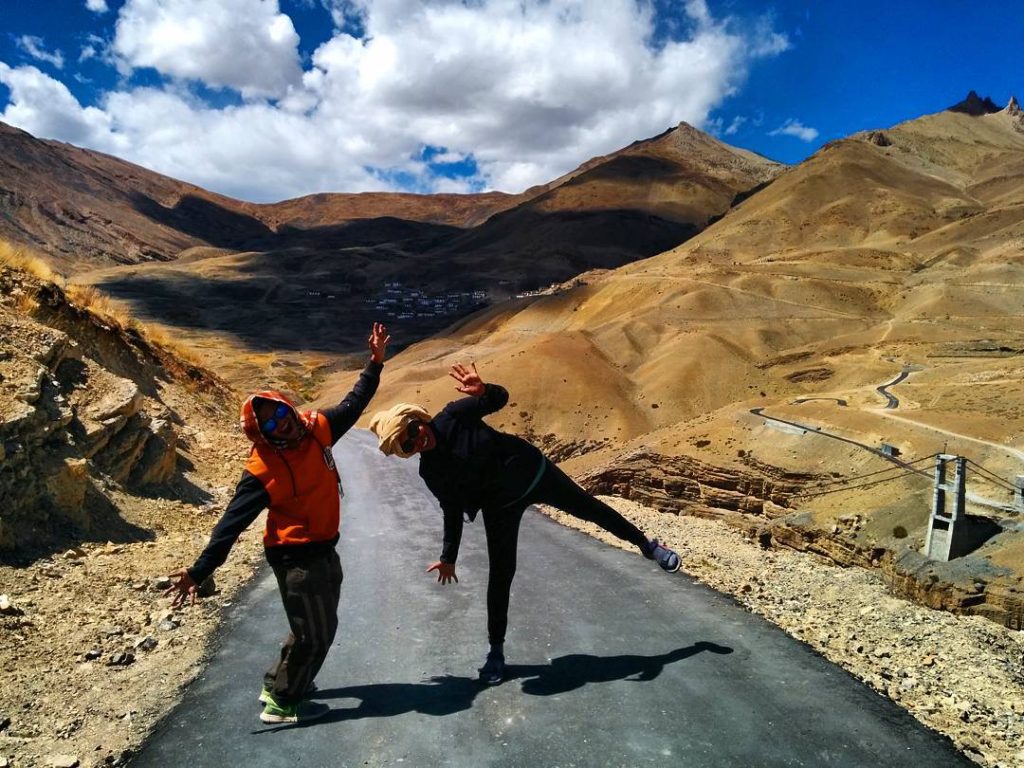
But it’s not just me who volunteers every bit and now. Like I said earlier, volunteering is pretty popular right now. The millennials and Gen-Z have started to embrace this concept and it keeps getting more and more popular as days go by.
If you didn’t get the concept, let me explain. It’s pretty simple. You work or volunteer at a place like a farm, hostel, or any kind of small business, and the host pays you not in cash but for a few nights’ stay at their accommodations and sometimes even takes care of your meals. The organization can be anything and not just local businesses. It can be a temple, an NGO, or sometimes even a small eatery.
If you are in a city where there are a lot of tourists, you’ll find ample opportunities at the city’s local hostels. Everyone’s looking for staff to work the desk or show around town. If you know a language that no other staff knows, you’ll be at an advantage.
I highly recommend giving Worldpackers a shot if you want to dip your toes in volunteering work. If you find it difficult to volunteer by asking around, simply sign up on the Worldpackers site and you’ll find plenty of volunteering opportunities.
Plenty of Projects + Your Skills and Effort = Good Quality Free Accommodation
Moreover, the Worldpackers team is adept at ensuring both you and your host have an enjoyable and secure experience. You have the freedom to select volunteer opportunities that align with your travel goals and talents.
If you have a passion for animals and eco-friendly initiatives, consider volunteering on a farm, ecovillage, or permaculture project. For those who enjoy socializing and a vibrant atmosphere, a work exchange in a hostel can lead to forming plenty of friends from all over the region. Or the world. And lastly, if you prefer doing meaningful work through social impact projects, you can try volunteering in communities, schools, or NGOs in breathtaking locations worldwide.
Alternatively, you can try giving WWOOF a shot too. To the uninitiated, WWOOF stands for the World Wide Organisation of Organic Farms. It’s a worldwide movement that connects visitors with organic farmers. You can volunteer at these farms in exchange for stay and board. But it’s not just about farming – it’s a chance for cultural exchange and learning, creating a community that cares about eco-friendly farming and sustainability. If you are looking to take a break from your usual travels and want to stay low, WWOOF is an excellent opportunity. And helps you travel cheaply too!
4. Try to become a Digital Nomad

If your current job is remote, have you ever considered taking your work outdoors? I’m talking about giving the digital nomad lifestyle a shot! You’ve probably heard about the excitement surrounding digital nomadism.
If you are a Digital Nomad, you can make full-time traveling a lot more sustainable. While making it cheap is a different concept altogether, making it a sustainable way of lifestyle is what many have been unsuccessful at. For starters, you need a steady flow of income. It’s easy if you are self-employed or an entrepreneur who’s super efficient at automating your business. But if you have to physically be present at your job or have people count on your presence, then you can kiss traveling full-time goodbye.
However, once you achieve a state where your work is fully remote and you get paid regularly, you can pack your bags and start traveling. As of right now, I’m handling my own marketing agency and this blog which is constantly growing. All work I do is remote and it funds all of my travels.
When you travel full-time, you tend to come across a lot of people. If you’re a bit on the shy side, you’ll be amazed at how your shyness tends to fade away after a year of full-time travel. Exposure to sheer volumes of people does that to you. And when you are out there meeting so many different kinds of people, you will also be opening yourselves up to plenty of opportunities.
If you are looking for a remote job, try Flexjobs and We Work Remotely. Both sites have a lot of remote job listings in different fields. From writing, virtual assistant jobs to website development and a lot more.
Working Nomads is a great site too. It delivers a curated list of remote jobs right to your inbox. Alternatively, you can give Angellist.co and Stack Overflow a shot too.
Pro Tip 1: I highly recommend constantly upskilling yourself. If you are a freelancer, upskilling yourself constantly will get you that competitive edge that you may need. When I started out, I learned to build websites on YouTube and Google. I would then pitch to different cafes and lodgings which led me to land my first few clients. Do not let your type of education limit you. Constantly upskill yourself, improvise, and adapt. Start by exploring SkillShare and choose any skill you want to upgrade or learn a new one.
Pro Tip 2: If you want to become a digital nomad and have no clue where to begin, you should check out Remote Year. It’s a program that lets you work remotely while exploring new places and connecting with a lot of people. Not only will you create memories but also meet a lot of people who can guide you on how to ride the waves of digital nomadism.
If you want to read more about how to be a Digital Nomad, check out How to Make Money while Traveling.
I was 18 when I first started traveling by myself. If a teenager can do it, so can you.
5. Try a Part-Time Gig
Another one of the nifty methods you can use to make your travels sustainable is trying out a part-time gig. If you have skills or some kind of certification, this is a good way to leverage it.
Some of the Part-Time gigs you can try:
- Waitress/Waiter – If you’ve got experience, finding a job as a waiter or waitress in seasonal restaurants worldwide during peak tourist seasons is a piece of cake. And you can make some good dough with tips too!
- Tour Guide – If you’re a history buff and don’t mind speaking in front of groups, being a tour guide should be right up your alley.
- Dive Instructor – Got your diving certification? Great job! Dive instructors are sought after everywhere, especially in breathtaking tropical destinations that have heavy tourist footfall. Enjoy your work while exploring picturesque locations.
- Au Pair – An au pair is like a live-in babysitter who lives with a host family, helping care for their kids and doing some light housekeeping. In return, you get a cozy room, meals, and a little extra cash. This is a great choice if you have a knack for experiencing the local culture, food, and lifestyle. It cannot get more authentic as this!
- Hostel Worker – As we mentioned earlier, hostels are constantly in need of new helping hands, and the turnover is pretty much always high. It’s an excellent opportunity to connect with fellow travelers while settling into a new place. You can even start as a volunteer (for a free room) to avoid any visa hiccups.
- Bartender – If you can mix a mean drink then you should definitely give bartending overseas a shot. You’ll not only be racking in tips but also be working only at night. This way, you can explore the city in the mornings and hustle at night.
- Dishwasher – Don’t feel equipped enough to handle any of the above gigs? You can sign up as a dishwasher. Your back may hurt and the pay is bound to be less but it will leave you with enough to pay for food and shelter. In most cases, the restaurant/cafe might even offer a meal. If you network well amongst your peers and fill in for the others, you might be able to move upward the ladder and get better pay. This is ideal if you are going to spend a long time at a location.
- Casino Worker – Some training may be needed, but if you’re a night person who enjoys the casino atmosphere, working abroad as a casino employee can be a thrilling experience.
- Pastry Cook/ Baker: Bread is often baked during the early hours of a restaurant/cafe. If you are into baking/pastry, you can leverage these skills by working as a baker/pastry cook. All the prep work and baking is done during the early hours of the cafe/restaurant. Rise early, show up to work, and then finish your shift somewhere around noon. You can then spend the entire remnants of your day exploring the city.
Pro Tip: When you are about to land one of these gigs, always find a way to negotiate for accommodation as well. Getting paid, a meal, and accommodation is a great deal. You’ll be able to sustain your travels a lot more and spend a longer time overseas.
6. Embrace Minimalism
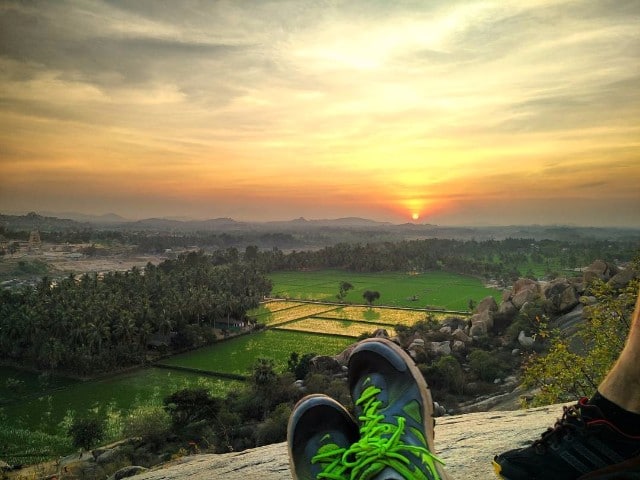
This might be a tough pill to swallow. Not every stay has to be at a 5-star. Or some spacious property with an indoor gym, pools the size of a football ground, buffet counter that could feed a country, or any other super exaggerated amenity. They also cost a lot and you don’t even get to explore your destination properly.
If you want to really enjoy a destination or a new place, you need to look at the location for what it is. Your travels will become a lot more life-changing if you get to know the place for its authenticity. Go for simpler lodging that is amidst the bustling lives of the locals. Eat the local food, explore the markets, and network with the locals. You’ll truly understand what the location is all about. You’ll learn to embrace their culture.
When I did the Annapurna Circuit (voted the best long-distance trek in the world), I had everything I owned in one single backpack and finished the trek with no prior trekking experience. It is one of my earliest experiences that changed my life forever. Since then I have embraced the art of minimalism.
Living simpler and without any material obligation is very cheap. Avoiding fine dining and eating the local food is very cheap. Traveling can be cheap if you get to know the place for what it is.
As I mentioned earlier, try volunteering for a stay. Or you can bunk in with other fellow travelers. You rent an apartment for a longer duration and agree to split the rent. You can source fresh and local ingredients from your nearest supermarket and eat home-cooked meals. You’ll even get to enjoy the local produce. Alternatively, you can try out some local and authentic food from the local diner or the food marketplace. These kinds of experiences are not only cheap but will also define your travel experiences. These are the kind of memories that will always stay with you.
When you get a taste of this kind of lifestyle, you’ll find that not only it is incredibly cheap but also that the whole luxury travel lifestyle is a bit too outdated and generic. Authentic raw experiences are what you should strive for.
7. Get a Rail Pass

This should be your priority right from the get-go. Getting a rail pass will open up a lot of avenues for you. You can travel to multiple locations as you please or change your destination mid-way. This complex intricate network of rail transport is some of the finest infrastructure for cost saving and traveling. You will never regret getting a rail pass.
I’ve set up a full guide when it comes to navigating Europe using a rail pass. Alternatively, you can get yourself a rail pass when in Japan too! Most countries even feature luggage transfer from the airport to the rail transport. While spontaneity is part of the charm, a bit of planning can help you make the most of your rail pass.
8. Invest in Best Gear Before You Travel
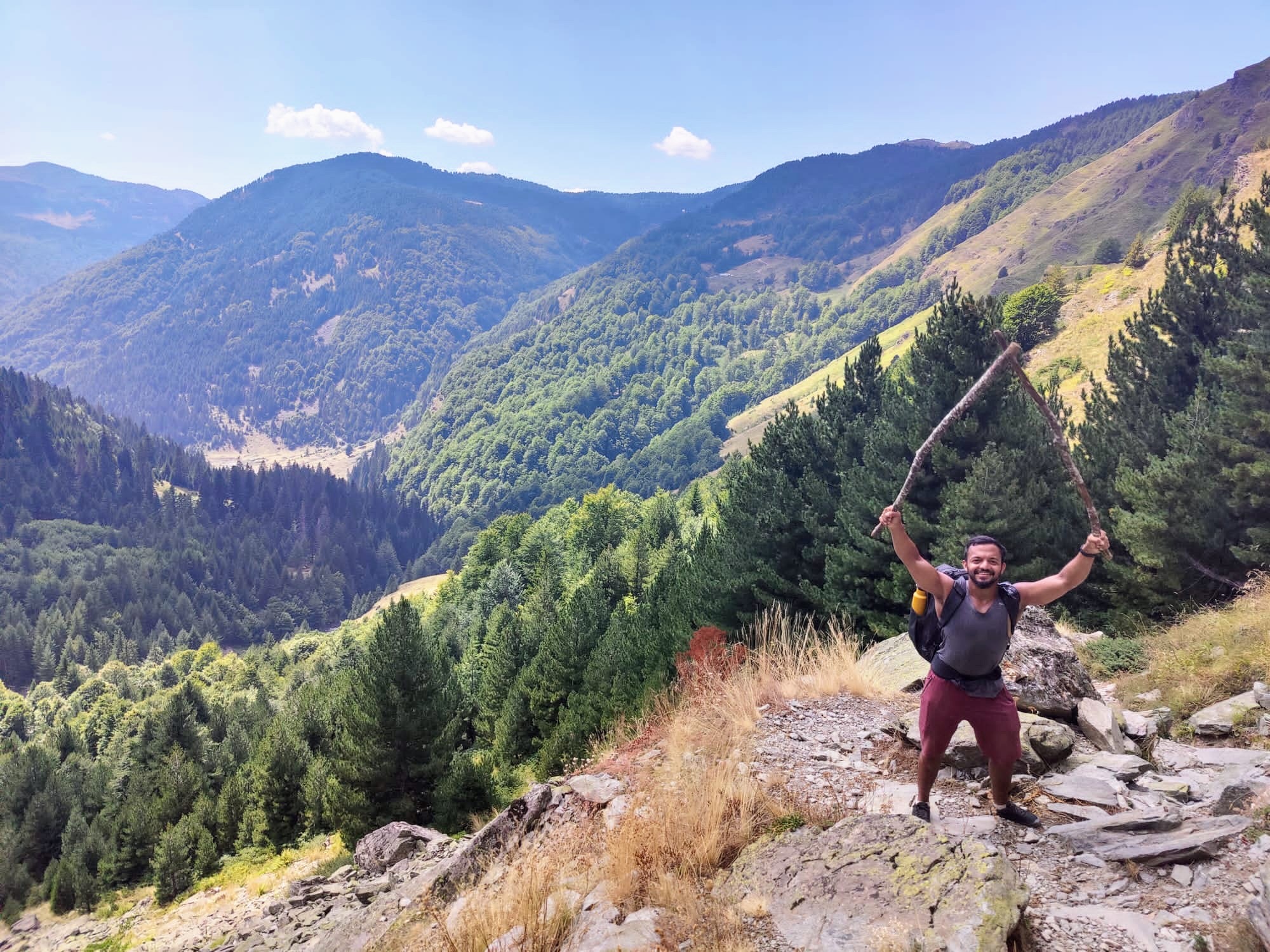
This one may seem odd and probably unheard of. The last thing you would want is the sole of your shoe coming off mid-trek or the shoulder strap of your backpack tearing apart. These are the kinds of inconveniences that can be so rage-inducing at times. You can replace the gear right away at your nearest shop. You can either buy something cheap that is made of low-quality material or buy something expensive that is made of better material.
Why not just buy the best gear at affordable rates before you disembark on your travels? Here’s some of the best travel gear I highly recommend for your adventures. The gear mentioned is not your typical run-of-the-mill stuff. These gear will last you long and will accompany you on not only one but multiple adventures.
Some of the Best Travel Gear you should buy:
- Best Travel Backpacks 2024 (Personally I use the Peak Design travel backpack and used to use the Nomatic travel bag before that)
Photography specific gear:
- Best Travel Tripods for Photography
- Best Camera Backpack for Travel Photographers
- Travel Photography Gear Guide
9. Research, Research More, and then Research Even More
I cannot emphasize this enough. Research before travel should be an integral part of your trip planning. Understanding the destination’s culture, customs, and etiquette will help you navigate social interactions with respect and sensitivity. This cultural awareness will help foster positive connections with locals, enhancing your overall travel experience. Getting along with the locals will help you make a lot more out of your travels affordability-wise.
Thorough research will also aid in crafting a well-informed itinerary, ensuring you don’t miss out on key attractions, events, or local hidden gems. It allows you to optimize your time and resources, making the most out of your visit. Moreover, understanding the local cuisine and dining customs lets you savor authentic flavors and avoid culinary pitfalls.
And let’s not forget safety. Familiarizing yourself with local laws, health considerations, and potential risks prepares you for unexpected situations. It enables you to make informed decisions, reducing the likelihood of encountering difficulties. Don’t want to book a flight to a city that has a heavy snow forecast.
Leave a Reply